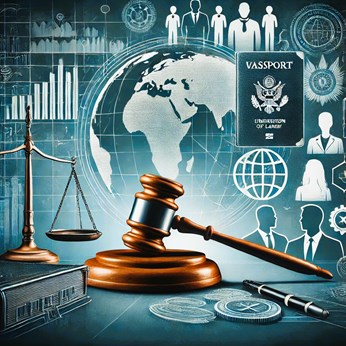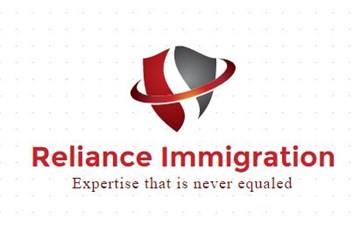The Intersection of Immigration and Employment Law: What Employers Need to Know

In today's globalized world, the intersection of immigration and employment law is a critical area that employers need to navigate carefully. Hiring immigrant workers offers numerous benefits, such as access to a diverse talent pool and the potential for unique skills that may not be readily available in the domestic labor market. However, it also comes with a set of legal obligations that employers must fulfill to ensure compliance with U.S. immigration laws. This blog will outline key considerations and best practices for employers to stay compliant and avoid potential legal pitfalls.
Understanding Employment Eligibility Verification
One of the first steps in hiring immigrant workers is verifying their eligibility to work in the United States. The U.S. Citizenship and Immigration Services (USCIS) requires employers to complete Form I-9 for each employee they hire, regardless of their immigration status. This form is used to verify the identity and employment authorization of individuals hired for employment in the U.S.
Key Points to Remember:
- Employers must ensure that the I-9 form is completed within three days of the employee’s start date.
- Employers are prohibited from discriminating against employees based on their citizenship or immigration status.
- It is important to retain the I-9 form for a specified period, even after the employee has left the company.
Compliance with E-Verify
In addition to the I-9 form, some employers are required or choose to use E-Verify, an electronic system that compares the information on the I-9 form against records in the Social Security Administration (SSA) and the Department of Homeland Security (DHS) databases. While E-Verify is mandatory for federal contractors and certain states, it is voluntary for other employers.
Considerations for Employers:
- E-Verify can provide additional assurance of compliance with immigration laws, but it also requires adherence to specific procedures.
- Employers using E-Verify must still complete and retain the I-9 form.
- The use of E-Verify does not eliminate the need for employers to be vigilant about potential discrimination claims.
Navigating Visa Requirements
Employers who wish to hire foreign nationals must understand the various visa options available and the associated requirements. The most common work visas include H-1B (for specialty occupations), L-1 (for intracompany transferees), and O-1 (for individuals with extraordinary abilities).
Key Visa Considerations:
- The H-1B visa process is highly competitive, with a limited number of visas available each year. Employers must plan and prepare in advance to participate in the lottery system.
- Employers sponsoring an H-1B visa must ensure that the job role qualifies as a specialty occupation and that the foreign national meets the educational requirements.
- Employers should be aware of the prevailing wage requirements and ensure they are offering a salary that meets or exceeds the wage standards for the position.
Wage and Hour Compliance
When hiring immigrant workers, employers must also comply with wage and hour laws, including the Fair Labor Standards Act (FLSA). This includes paying the appropriate minimum wage, overtime, and ensuring that working conditions meet federal and state standards.
Wage Compliance Tips:
- Employers should be cautious about misclassifying employees as independent contractors, as this can lead to significant legal issues.
- It’s important to understand the specific wage and hour laws in the state where the employee will be working, as state laws can sometimes be more stringent than federal laws.
- Employers should maintain accurate and up-to-date records of hours worked and wages paid to avoid potential disputes or penalties.
Anti-Discrimination Obligations
The Immigration and Nationality Act (INA) includes provisions that prohibit employers from discriminating against employees based on their citizenship or immigration status. This means that employers must treat all employees equally, regardless of their nationality.
Avoiding Discrimination:
- Employers should implement policies and training programs to educate their staff on anti-discrimination laws.
- It’s crucial to apply the same standards and procedures to all employees, whether they are U.S. citizens or foreign nationals.
- Employers must avoid any practices that could be perceived as discriminatory, such as requiring additional documentation from immigrant workers beyond what is legally required.
Conclusion
Navigating the intersection of immigration and employment law can be challenging, but it is crucial for employers to understand and comply with their legal obligations when hiring immigrant workers. By staying informed and implementing best practices, employers can ensure that they are providing a fair and lawful workplace for all employees.
If you need assistance navigating the complexities of immigration and employment law, or if you are looking to hire immigrant workers, Sulekha Legal Services is here to help. Our experienced legal professionals can provide the guidance and support you need to stay compliant with U.S. immigration laws. Contact us today to learn more.
Searching for Legal Services? Let’s make your search simple with professionals!
Take your Legal Services to the next level with Sulekha. Boost your online visibility, connect with more clients, and grow effortlessly!
Blogs Related to Legal Services

What to Do Immediately After an Accident to Protect Your Rights
What to Do Immediately After an Accident to Protect Your Rights A sudden car accident law can leave anyone shaken and overwhelmed. Yet, the moments right after a crash are crucial if you want to protect your legal and financial rights. Knowing what

How a Product Liability Lawyer Can Help You Secure Fair Compensation
How a Product Liability Lawyer Can Help You Secure Fair Compensation A product liability lawyer

Indian American Car Accident Lawyer: Navigating US Law for Your Case
Understanding the Role of an Indian American Car Accident Lawyer Being involved in a car accident in the United States can be stressful, especially for Indian immigrants who are still getting used to the American legal system. This is where an India

How to Choose the Best Product Liability Lawyer for Your Case?
How to Choose the Best Product Liability Lawyer for Your Case? When you’ve been injured or suffered financial loss because of a defective product, finding the right product liability lawyer can make all the difference. These cases often involve larg

Insurance Lawyers: Your Friendly Shield in the World of Claims
Why Insurance Lawyers Matter More Than Ever Let’s be real—insurance paperwork is about as fun as watching paint dry, right? But when life throws a curveball (hello, denied claims or confusing policy language!), an insurance lawyer can step in like

The Day Free Speech Stood Still: Charlie Kirk’s Assassination
Charlie Kirk’s Assassination and What Comes Next On September 10, 2025, Charlie Kirk, the conservative activist and co-founder of Turning Point USA, was fatally shot at an outdoor event hosted at Utah Valley University




